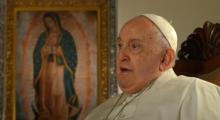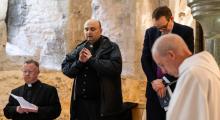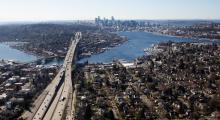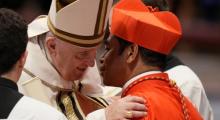Issued by the Catholic Center for Studies and Media - Jordan. Editor-in-chief Fr. Rif'at Bader - موقع أبونا abouna.org
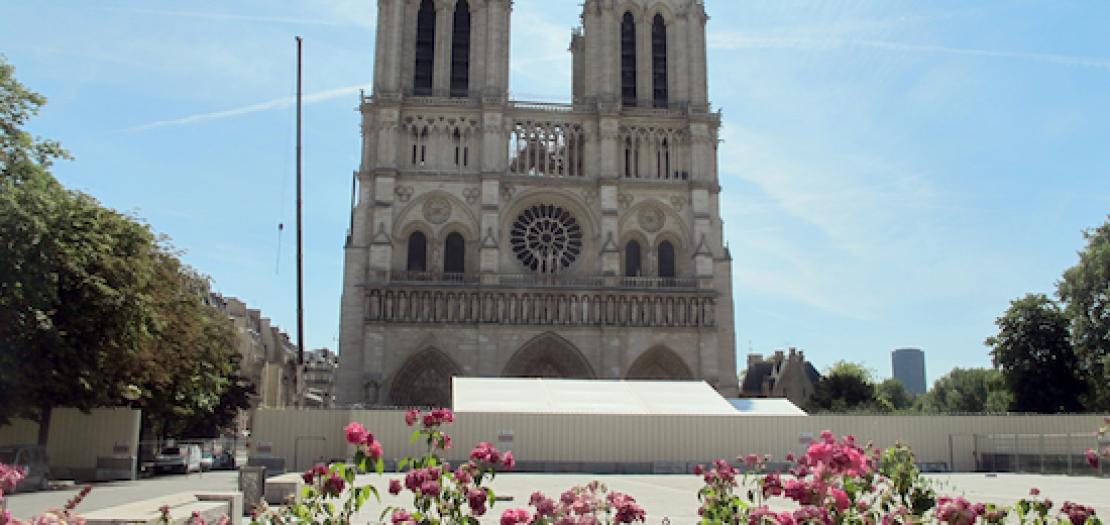
The restoration of the Paris cathedral has sparked a debate over whether it is primarily a place of spiritual or cultural significance.
For the past three months, following the fire that destroyed the spire, roof and part of the vault of Notre-Dame Cathedral, the vast restoration project has caused believers and non-believers to question their attitude toward the Paris landmark.
"This cathedral is a place of worship and it has its own, unique purpose. This religious property, this spiritual treasure, cannot be reduced to merely a heritage property."
In uttering these words on June 15, with a construction helmet on his head, during an unusual Mass in a Notre-Dame cluttered with rubble and inaccessible to the general public, Archbishop Michel Aupetit was keen to forcefully remind us that the cathedral's primary purpose was spiritual.
"Can we really separate culture and worship due to ignorance or ideology?" the archbishop of Paris asked.
"The etymology itself shows the strong link between the two. I say it forcefully: a culture without worship becomes devoid of culture."
Why the need for such a definitive statement and the will it expresses to bring the cathedral back into the Catholic fold?
A SWIMMING POOL ON THE ROOF?
"Since the Notre-Dame fire, we have heard a number of speeches aimed at questioning the role of the cathedral," says Philippe de Cuverville, director-general of economic affairs of the Diocese of Paris.
"The homily on June 15 was an opportunity for Archbishop Aupetit to respond to those speeches, recalling that the cathedral, the mother church of the diocese, had been built for a very specific purpose."
The two months between the fire on April 15 and the bishop's homily offered architectural firms around the world the opportunity to propose the most eccentric reconstruction projects, including one by the Swedish firm Ulf Mejergren Architects for a swimming pool to be built on the roof.
Furthermore, on June 18, in the columns of daily newspaperL'Opinion, the Grand Orient de France, the largest of the country's many Masonic organizations, opined that "this national historic monument is a place of culture. We do not see it as a place of worship."
'FRUITFUL EXCHANGES' BETWEEN CHURCH AND STATE
In reality, however, the principal designation of Notre-Dame to Catholic worship has never been seriously questioned.
"Today, there is no tension with the state services," insists Monsignor Patrick Chauvet, the rector of the cathedral, who maintains he is "serene" concerning the provisions of the bill governing its restoration.
"The assignee remains an assignee during the work — it is very clear," he adds.
"I have had the guarantees of President Macron and the minister of culture that Notre-Dame is first and foremost a place of worship, even if it belongs to everyone. I see a desire on the part of the state and the city, as far as the square is concerned, to work together and not to oust the Church."
The diocesan treasurer, Philippe de Cuverville, also speaks of "very fruitful exchanges."
"With regard to interior design, it is obvious that the assignee has more than his or her say," he says, referring to the establishment of a commission dedicated to liturgical design by Archbishop Aupetit.
The bill on "the conservation and restoration of Notre-Dame" also offers a new role for the diocese, since it provides that the restoration project and all future finances will be administered by a council where representatives of the diocese and the Council of Paris officials will sit alongside those of the state.
Amid the emotion caused by the fire, the drafters of the first version of the bill did not notice the exception they had created with regard to the secular regime.
"There was a clear risk of creating a precedent — and possible dysfunctions — whereas we currently have a system that distinguishes between owner and assignee that works well, and with which the Catholic Church is very satisfied," says MP Raphaël Gérard.
In the debates in the French National Assembly, Gérard had argued that representatives of the diocese should instead become members of the scientific committee responsible for advising the state. He has been strongly criticized for that comment, a clear sign of how sensitive the culture-religion distinction has become.
"We are quickly suspected by some Catholic deputies of wanting to attack the Church. I was called a layman of another age," he said with a smile.
The draft text that will be debated by the deputies on July 17 maintains the presence of the diocese on the board of directors of the future public institution. It also, however specifies that their collaboration must be in compliance with the laws of 1905 and 1907.
This is a compromise that satisfies the MP. "This clearly sets a precedent but it can also make relations between the Drac [local council] and the diocese more fluid," he said.
A MONUMENT, MULTIPLE APPROPRAITIONS
While there was one common emotion on the evening of the disaster, it has emerged that there are differences in the way the cathedral is viewed.
"Notre-Dame is not only a place of worship. It is also a resonance chamber of history, of France, of Christianity, and of man in general," says historian and medievalist Claude Gauvard.
For many Catholics, there is no suggestion of claiming exclusivity. On July 4, during the annual session of the UNESCO World Heritage Committee, Monsignor Francesco Follo, the observer of the Holy See, recalled the religious dimension of the cathedral but also expressed the Vatican's wish that it be returned "to believers, unbelievers and future generations."
"The Dame of Notre-Dame is capable of building a larger us than that of a tribe," emphasizes philosopher and Christian Jean-Philippe Pierron.
"To say that the use of Notre-Dame should only be religious or that there should be no tourists would be blindness, a denial of reality."
As a sign that Notre-Dame's place in society is a complex object, a group of researchers was recently assembled to work, under the aegis of the CNRS and the Ministry of Culture, on the "emotions and mobilizations" that the fire has generated.
"The question of the intertwining of religious and heritage sacredness will be part of our work," says anthropologist Gaspard Salatko.
"We will also question the unanimity speech that emerged after the fire and seek to understand how this event questions the very singular relationship that has been established since 1905 between Church and state."


